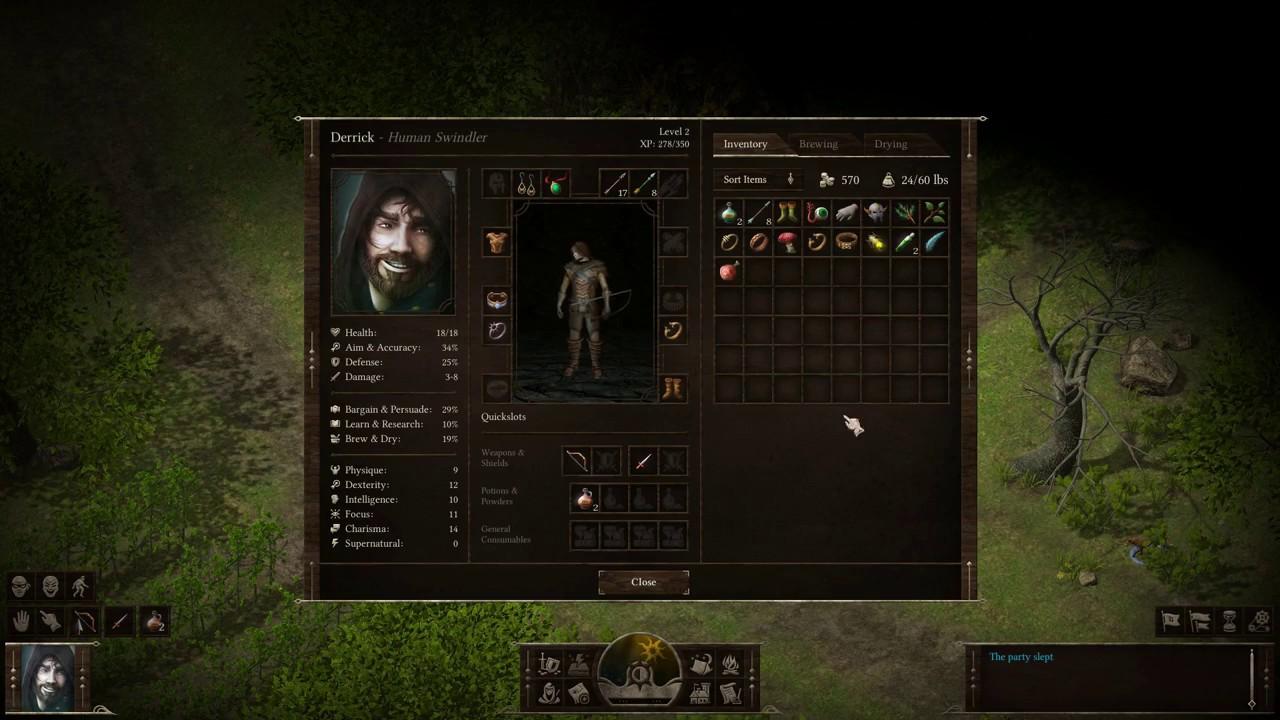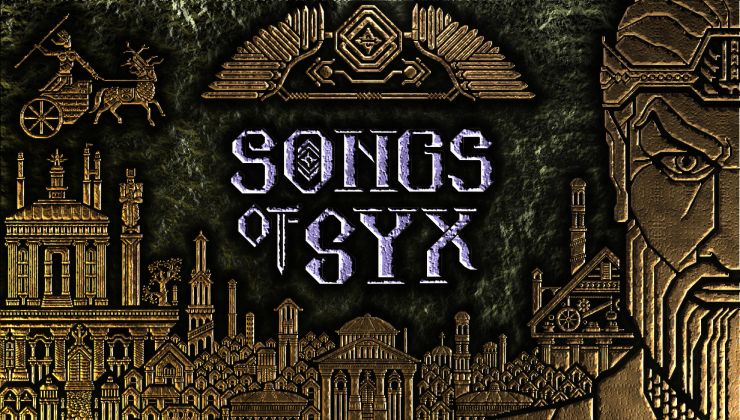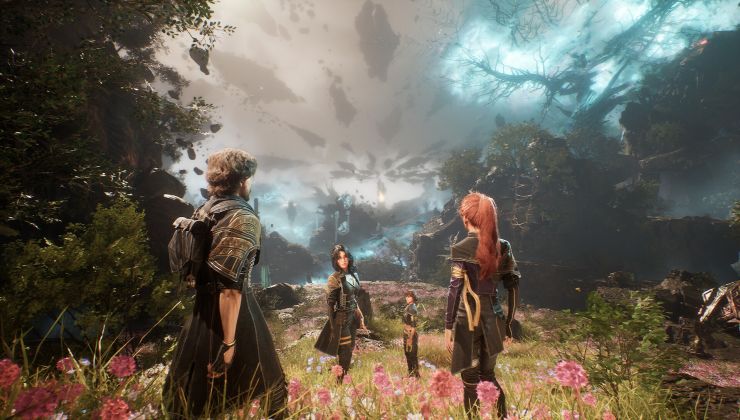Set in a world that’s being beset by a curse of greed, this isometric RPG is trying to put its own unique touches on the tried and true formula.

Direct Link
Black Geyser: Couriers of Darkness [Official Site] is set in a kingdom that’s close to civil war and chaos grows ever day. This is a title that takes clear inspiration from Dungeons and Dragons and games like Baldur’s Gate. Many of the same elements such as an assortment of familiar fantasy race archetypes and classes feature in the game. Things like recruiting characters to your party, primary and secondary quests, magic and abilities, crafting potions and all those other staples will be in there as well.
What caught my eye in this one was the premise of most of the conflict is a curse brought on by a dark goddess that causes greed to grow in the hearts of people. The impact of the curse is determined by the player’s actions as things like looting everything and taking every reward can increase the effects on the world. This can lead to NPCs acting differently and lying, bandits assaulting estates and even the dead rising to reclaim things you’ve looted from them. It’s the sort of thing that I think will make or break the game as how this ties into quests and the meaningful choices players can make in a playthrough will ultimately define how things play out and determine replay value.
Black Geyser has been in development for a while and has turned to crowdfunding to finish up content and to polish the game. It’s projected to be released next year on both GOG and Steam when it’s completed.
You can back the game or read more about it on its Kickstarter page.
Thanks for the tip, Cyril
Quoting: tuubiI'm not quite sure what that means. Before capitalism nearly all people didn't do wage labour. Under capitalism, most people do. It would be wrong to say absolutely everything is different, but it would also be wrong to claim that structures of how people work and live didn't change in pretty fundamental ways. When water freezes, there's continuity--it's still water--but you can make some pretty broad statements about what's different.Quoting: Purple Library GuyWhat about 'em? In case you hadn't noticed, we have powerful warrior classes now. And yet I'm not trying to claim capitalism isn't a real thing.Neither am I. And I'm not claiming that feudalism was basically capitalism. All I'm saying is that capitalism is more or less an adaptation and evolution of what was before. As you said, we define capitalism by its differences to other paradigms. This definition serves a purpose, but isn't very objective or scientific. Of course it's by evolution and adaptation that all economic and political systems form.
Quoting: tuubiI have no proof they didn't, no. But you can't really build an argument on "I can't prove otherwise". There are a lot of ridiculous things I can't prove to be false.Quoting: Purple Library GuyIn the old days merchants existed and made money, but they didn't rule, and if aristocrats got fed up with them they took their stuff. What constituted dog and what constituted tail was different, and what was considered the important social virtue was different. Compound interest was often illegal. And who dominates song and legend is far from beside the point. Vikings had song and legend about great warriors, we have news shows dominated by talk of the stock exchange and media that talks incessantly about lifestyles of the rich and famous--many of them famous solely for being rich.And why do you think people didn't gossip about the lavish lifestyles of rich merchants and traders back then? Again, you might point out that their surviving legends are violent, but so is most modern entertainment.
I mean, I'm sure people talked about rich merchants some. Just, not as much as they talked about rich clergy, or powerful warlords. Medieval merchants simply were not ancient counterparts to modern capitalists; they had a much tinier slice of the economic action. Commerce was much smaller compared to the economy as a whole, and merchants engaged in commerce didn't control production. Medieval merchants were kind of like just the modern shipping and trucking and freight rail businesses--IF those businesses were about a tenth their actual size. Well, no, because they did own the cargos, but like, say you had people who bought Hondas from Japan, shipped them to North America and sold them to dealerships at a markup--except hardly anyone ever bought foreign cars. It would be a noticeable group that made some money, sure, but it wouldn't be central.
Quoting: tuubiYou have a point. The vikings were excellent craftsmen and had plenty of their own stuff to trade. I exaggerated there. As to all the same people--all I was getting at was that the vikings unusually didn't really have a separate warrior vs. peasant class or warrior vs. merchant class. Kings had dedicated warbands and such, but in general they had a lot of reasonably independent farmers, fishermen and whatnot, who were armed and could fight, and who sometimes went viking, sometimes went trading, and sometimes went to do whichever looked like the best bet when they got wherever they got to. I wouldn't be surprised if increasing social stratification was part of what ended the "viking age".Quoting: Purple Library GuyThe vikings were actually a little odd in that their merchants, raiders, conquerors, and even peasants, were pretty much all the same people. But a lot of what they traded was precisely things they had stolen while viking--and people, actually; the viking slave trade was huge for a while. But these multi-role people, if you look at their own accounts, cared the most about the raiding and conquest and fighting--that was what made a man respected and followed. The merchant stuff was fine, but it wasn't as important, it wasn't what society was about.What do you base all this on? Sure, vikings traded on all kinds of valuables and commodities, even slaves, just like their foreign peers. But they were also world class craftsmen. And their merchants, jewelers, blacksmiths and whatnot were just that, not raiders who also dabbled in a bit of trade.
Quoting: tuubiIn any case, trying to reduce any society to a single value or ideal is counterproductive. That forces you to ignore the human factor. Life might have been simpler, but not to such an extreme degree.I respect you, but really, have you been reading what I'm writing or some funhouse mirror version of it? I feel this is a serious misrepresentation of my thesis and my extensive "human factor" qualifications of it. It's quite annoying.
Yes, yes, the world is messy, whatever. That does not mean there are no patterns to be observed. Human society is dominated by human ideas, human ideologies. And human ideas tend to be simple at the core. There are all kinds of reasons why any given dominant ideology doesn't control the whole show, why complexity comes in will we or nill we, but that doesn't mean those dominant ideas are not dominant or that they themselves are not fundamentally simple.
Quoting: tuubiI really don't quite see which bit of what I've been saying constitutes romanticized yearning for excitement. If anything I've been quite negative and brutal about the ethos both of the medieval and dark ages past and the 18th c. to modern era. I have been drawing a picture of two different elites running things for their own benefit largely to the detriment of everyone else--just in very different ways, with different basic organizing concepts and productive systems.Quoting: Purple Library GuyI really think we tend to overestimate that aspect because it's what we care about and it reassures us to think people back then were just like us, that what we care about is inevitably what everyone has to care about.I'll ignore the slightly patronizing tone, but you're right, I do assume our basic needs are the same as those of people a thousand years ago. I actually think it's the other way around: We tend to romanticize and mythologize people we have no direct experience of. Even famous historians and archaeologists have commonly fallen into this seductive trap. We have this strange need to make history seem exciting when most of it is decidedly not.
But maybe we're getting slightly off topic here? :P
Our fundamental needs are to some extent beside the point. Our fundamental needs are the same as those of stone age hunter-gatherers, but one cannot claim that stone age hunter-gatherers were motivated by anything we could productively call profit; they were (and the few remaining ones are) as human as anyone else, but clearly had no merchant class at all or anything like one. So why would our fundamental needs somehow make it necessary that such a class be terribly important in medieval times? (Incidentally I'm not claiming a linear progression or anything--profits and mercantile endeavours and even investment were very important in the late Roman empire, but they kind of stopped being when it fell)
Ah, well, yeah. Very very off topic.
Quoting: Purple Library GuyAnd that was my entire point. I wasn't asking you to prove a negative. Just wanted to point out that there were wealthy merchants trading in the fruits of others' labours already. There were entire market towns with real economies and social structures, and it wasn't just kings getting rich in the process. That wealth might have been bullion or jewelry or just basic commodities, but it was still wealth mostly for the sake of wealth.Quoting: tuubiAnd why do you think people didn't gossip about the lavish lifestyles of rich merchants and traders back then? Again, you might point out that their surviving legends are violent, but so is most modern entertainment.I have no proof they didn't, no. But you can't really build an argument on "I can't prove otherwise". There are a lot of ridiculous things I can't prove to be false.
I mean, I'm sure people talked about rich merchants some. Just, not as much as they talked about rich clergy, or powerful warlords.
Quoting: Purple Library GuyAs to all the same people--all I was getting at was that the vikings unusually didn't really have a separate warrior vs. peasant class or warrior vs. merchant class.Well, I don't know how uncommon that really was. Kings and nobles drafted soldiers from the peasant classes mostly, with nobles themselves leading the armies. Successful merchants weren't likely to grab an axe and go on a raid either. But I do see what you mean.
Quoting: Purple Library GuyI wouldn't be surprised if increasing social stratification was part of what ended the "viking age".Sounds plausible. And interaction between the different cultures and societies around Europe and elsewhere probably played a part in shaping these strata, with trade a likely driving force.
Quoting: Purple Library GuyMy apologies. I'm certainly not trying to annoy you. I'm actually enjoying our conversation.Quoting: tuubiIn any case, trying to reduce any society to a single value or ideal is counterproductive. That forces you to ignore the human factor. Life might have been simpler, but not to such an extreme degree.I respect you, but really, have you been reading what I'm writing or some funhouse mirror version of it? I feel this is a serious misrepresentation of my thesis and my extensive "human factor" qualifications of it. It's quite annoying.
("I respect you, but..." :'()
Quoting: Purple Library GuyYes, yes, the world is messy, whatever. That does not mean there are no patterns to be observed. Human society is dominated by human ideas, human ideologies. And human ideas tend to be simple at the core. There are all kinds of reasons why any given dominant ideology doesn't control the whole show, why complexity comes in will we or nill we, but that doesn't mean those dominant ideas are not dominant or that they themselves are not fundamentally simple.What I was trying to say was that these dominant ideas have never been as dominant as we'd like to think. What historians tend to concentrate on is what changes, not what stays the same.
Quoting: Purple Library GuyI really don't quite see which bit of what I've been saying constitutes romanticized yearning for excitement. If anything I've been quite negative and brutal about the ethos both of the medieval and dark ages past and the 18th c. to modern era.Overemphasis on the brutal and the negative is part of what I mean. Most vikings never went viking, and the dark ages produced some really remarkable works of art and advances in science.
Quoting: Purple Library GuyI have been drawing a picture of two different elites running things for their own benefit largely to the detriment of everyone else--just in very different ways, with different basic organizing concepts and productive systems.Yes, the mechanisms and methods change, but what I dispute is the grand difference between ancient and modern elites. Wealth takes many forms, but ultimately it's always been about "greed", or the pursuit of wealth and power. If the way to fame and fortune is through warfare or business makes little difference in the grand scheme of things. Especially as warfare has always been and still is often motivated by the pursuit of wealth or personal power.
Quoting: Purple Library GuyOur fundamental needs are to some extent beside the point. Our fundamental needs are the same as those of stone age hunter-gatherers, but one cannot claim that stone age hunter-gatherers were motivated by anything we could productively call profit; they were (and the few remaining ones are) as human as anyone else, but clearly had no merchant class at all or anything like one."Profit" might be a relatively modern term, but I don't see how that changes anything. This discussion was originally about greed. Even stone age societies, wherever those formed, had a distinct pecking order where some had it all (power, first pick of the tastiest berries and most desirable mates) and others did not. And, allowing for different personalities and whatnot, people did seek to improve their station and gather the equivalent of wealth.





 How to setup OpenMW for modern Morrowind on Linux / SteamOS and Steam Deck
How to setup OpenMW for modern Morrowind on Linux / SteamOS and Steam Deck How to install Hollow Knight: Silksong mods on Linux, SteamOS and Steam Deck
How to install Hollow Knight: Silksong mods on Linux, SteamOS and Steam Deck